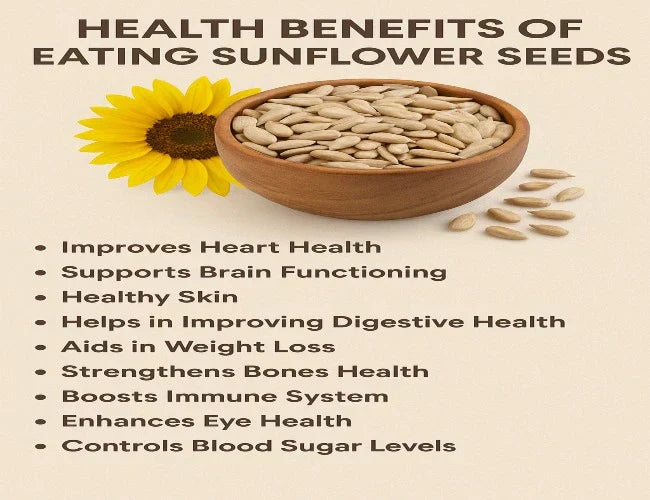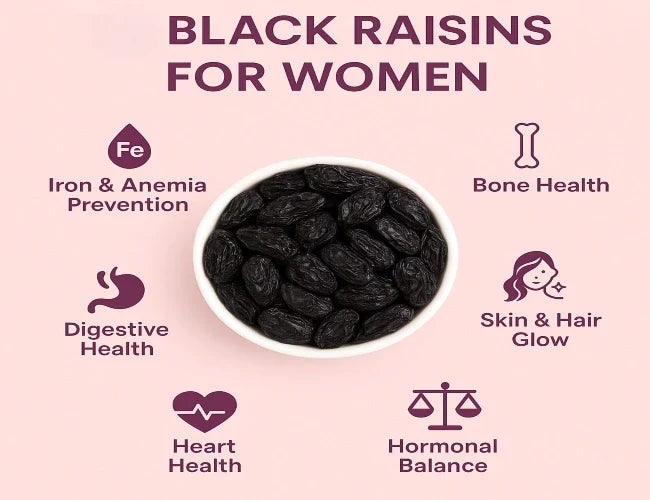In addition to being a delicious snack, sunflower seeds provide several health advantages. When it comes to using sunflower seeds, we may use them in salads or to produce butter. These little seeds provide several health advantages for both men and women and are enhanced with vital nutrients. From their nutritional worth to their beneficial impacts on numerous parts of human health, we will examine the advantages of sunflower seeds for both men and women in this article. Thus, sit back, unwind, and prepare to learn about the health benefits of sunflower seeds and How to eat sunflower seeds.
What is the Nutritional Value of Sunflower Seeds?
With a wealth of vitamins, minerals, and good fats, the nutritional value of sunflower seeds is a powerhouse. Vitamin E serves as a potent antioxidant in the body, shielding our cells from harm brought on by free radicals. Sunflower seeds are also a good source of B vitamins, including thiamine, riboflavin, and niacin, which are essential for a healthy neurological system and the body's ability to produce energy. Unsalted dry-roasted sunflower seeds typically have the following nutritional contents in a serving of ¼ cup:
| Sunflower Seeds Nutrients | Amounts per serving (1oz / 28..5g) |
| Fiber | 3.9 grams |
| Carbohydrates | 7 grams |
| Protein | 5.8 grams |
| Calories | 207 kcal |
| Healthy Fat | 19 grams |
Different Types of Sunflower Seeds
There are several types of sunflower seeds. The primary kinds are as follows:
-
Black oil sunflower seeds are tiny black seeds mostly used as bird feed and to manufacture sunflower oil.
-
Larger seeds with striped shells that are frequently consumed as snacks are known as striped sunflower seeds.
-
Hulled sunflower seeds are striped seeds that have had their shells removed and are used in baked products and salads.
Sunflower Seeds Health Benefits
-
Improves Heart Health: The nutritious value of sunflower seeds have high monounsaturated and polyunsaturated fat content making them heart-healthy. These heart-healthy fats minimise the risk of heart disease by lowering bad cholesterol (LDL) levels.
-
Supports Brain Functioning: Sunflower seeds' high vitamin E content is essential for maintaining brain health. It prevents cognitive decline and enhances memory and focus by shielding brain cells and neurones from oxidative damage.
-
Healthy Skin: Eating sunflower seeds has several advantages for your skin. Sunflower seeds' high vitamin E concentration helps to maintain healthy skin by scavenging free radicals, which can hasten the ageing process.
-
Helps in Improving Digestive Health: Sunflower seeds are a good source of dietary fibre, which promotes regular bowel motions and aids in better digestion. The fibre content promotes the growth of good gut bacteria.
-
Aids in Weight Loss: Eating sunflower seeds for weight loss may work wonders. Sunflower seeds are a filling and nutrient-dense snack, despite their tiny size. Because of Sunflower seeds' protein content, they help you feel full and less likely to go for harmful snacks. Sunflower seeds for weight loss are thus recommended.
-
Strengthens Bones Health: Minerals necessary for bone health, such as copper, calcium, and magnesium, are found in sunflower seeds. By increasing bone density and strength, these minerals lower the risk of osteoporosis and fractures.
-
Boost Immune System: Packed with vitamins, minerals, and antioxidants, sunflower seeds help maintain a strong immune system. Sunflower seeds include selenium and vitamin E, which support a stronger immune system and shield the body from illness.
-
Enhances Eye Health: Packed with vitamin E and other antioxidants, sunflower seeds help shield the eyes from age-related macular degeneration and oxidative stress. Sunflower seeds promote healthy vision and lower the risk of cataracts.
-
Controls Blood Sugar Levels: By reducing the blood's absorption of glucose, sunflower seeds' high fibre content helps control blood sugar levels. The insulin sensitivity is in control because of the magnesium content of sunflower seeds.
- Offers Anticancer Qualities: Sunflower seeds include antioxidants that help fight off free radicals and shield cells from harm, which may lessen the chance of developing some types of cancer. Sunflower seed phytosterols have anticancer qualities as well.
Also Read - 10 Amazing Health Benefits of Basil Seeds
Sunflower Seeds Benefits for Men and Women
-
Health Benefits of Sunflower Seeds for Males: Sunflower seeds provide a number of health advantages for males. They contain a lot of vitamin E, which promotes reproductive and prostate health. The seeds' zinc aids in the production of testosterone, which is necessary for fertilisation. Sperm are shielded from harm by selenium.
-
Health Benefits of Sunflower Seeds for Women: Women can benefit from sunflower seeds as they include folate, which is beneficial for reproductive health, and are high in vitamin E, which supports healthy skin. The seeds' magnesium promotes bone health and reduces PMS symptoms. The necessary fatty acids aid in hormone regulation. Consuming sunflower seeds can improve nutritional intake, hormone balance, and general wellness.
Additional Benefits
- Anticancer Properties: Antioxidants and phytosterols in sunflower seeds may reduce cancer risk.
- Hair Health: Vitamin E improves scalp circulation, prevents hair loss, and strengthens hair.
How Many Sunflower Seeds Should You Eat Daily?
About 1 to 2 tablespoons (15–30 grams) of sunflower seeds per day is a healthy quantity for most people. You get the benefits of this without ingesting excessive amounts of calories or running the danger of overexposure to specific minerals. For guidance specific to your health requirements, always consult a healthcare professional.
How to Eat Sunflower Seeds Every Day for Maximum Health Benefits?
There are a few easy methods to incorporate sunflower seeds into your regular diet:
-
Snack on Them: In between meals, munch on a handful of sunflower seeds.
-
Add to Salads: To give salads more crunch and nutrients, sprinkle them with sunflower seeds.
-
Blend in Smoothies: To add extra nutrients and a creamy texture, blend sunflower seeds into smoothies.
-
Combine with Yoghurt or Muesli: For a wholesome breakfast, mix sunflower seeds into yoghurt or scatter them on top of muesli.
-
Use in Baking: To add taste and texture to baked bread, muffins, or granola, add sunflower seeds.
-
Top Stir-Fries or Soups: For a crisp touch, add sunflower seeds to stir-fries or soups right before serving.
Also Read - Chia Seeds for Weight Loss: What You Need to Know
Sunflower seeds are a nutrient-packed snack that offer numerous health benefits, including enhanced heart health, better digestion, glowing skin, and weight management, along with boosting immunity, promoting brain function, strengthening bones, and supporting overall well-being in both men and women.




Leave a comment
All comments are moderated before being published.
This site is protected by hCaptcha and the hCaptcha Privacy Policy and Terms of Service apply.